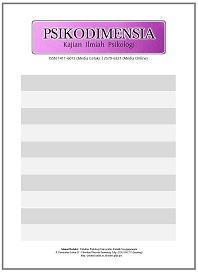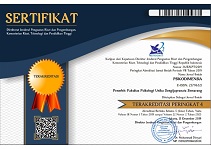Identifikasi Perceived Reward pada Fans K-pop
Abstract
Ketenaran K-pop secara global, khususnya di Indonesia, menjadi perbincangan hangat di kalangan masyarakat. Munculnya banyak fans yang secara loyal mendedikasikan diri dengan mengeluarkan waktu, uang, dan tenaganya untuk idola K-pop. Penelitian ini bertujuan untuk mengetahui perceived reward yang diterima, fungsi dari reward, serta cost yang dikeluarkan oleh fans ditinjau dari hubungan social exchange dari sudut pandang fans terhadap idola. Penelitian ini menggunakan metode kualitatif dengan teknik pengumpulan data berupa open ended questionnaire dan wawancara. Teknik sampling yang digunakan adalah snowball sampling. Pengambilan data dilakukan dengan memberikan kuesioner kepada 78 responden dan wawancara semi structured terhadap 3 narasumber yang merupakan fans K-pop. Data yang diperoleh diverbatim dan dikoding. Analisa data menggunakan teknik analisis tematik. Hasil penelitian menunjukkan bahwa fans mendapatkan perceived reward dari idola mereka dalam bentuk reward intagible serta berasal dari sesama fans dalam bentuk reward intagible dan tangible. Fungsi reward bagi fans K-pop adalah sebagai moodbooster, support system, role model, melepas penat dan pelarian sementara. Cost yang dikeluarkan oleh fans antara lain pengeluaran uang, habisnya waktu yang diluangkan, dan emosi yang terkuras.
Keywords
Full Text:
PDF (Bahasa Indonesia)References
Adam, A., & Sizemore, B. (2013). Parasocial romance: A social exchange perspective. Interpersona: An International Journal on Personal Relationships, 7(1), 12-25.
Anggraeni, D. (2021). Tren Usaha Merchandise K-pop: Photocard Decoration. In Prosiding National Seminar on Accounting, Finance, and Economics (NSAFE) (Vol. 1,
No. 11).
Birt, L., Scott, S., Cavers, D., Campbell, C., & Walter, F. (2016). Member checking: a tool to enhance trustworthiness or merely a nod to validation?. Qualitative health
research, 26(13), 1802-1811.
Burke, P. J. (2006). Contemporary social psychological theories. Stanford University Press.
CNN Indonesia. (2022). Indonesia Jadi Negara dengan K-Poper Terbesar di Twitter. Diakses dari https://www.cnnindonesia.com/hiburan/20220126202028-227-
/indonesia-jadi-negara-dengan-k-poper-terbesar-di-twitter
Chen, L., Chen, G., Ma, S., & Wang, S. (2022). Idol worship: how does it influence fan consumers’ brand loyalty?. Frontiers in Psychology, 13.
Darfiyanti, D., & Putra, M. G. B. A. (2012). Pemujaan terhadap idola pop sebagai dasar intimate relationship pada dewasa awal: sebuah studi kasus. Jurnal psikologi
kepribadian dan Sosial, 1(2), 53-60.
Harahap, N. (2020). Penelitian Kualitatif.
Homans, G. C. (1958). Social behavior as exchange. American journal of sociology, 63(6), 597-606.
Horton, D., & Richard Wohl, R. (1956). Mass communication and para-social interaction: Observations on intimacy at a distance. Psychiatry, 19(3), 215-229.
IDNTimes. (2019). Jadi Gaya Hidup, Benarkah Fans KPop Kaya Raya atau Cuma Modal Kuota?. Diakses dari https://www.idntimes.com/hype/entertainment/danti/jadi-
gaya-hidup-benarkah-fans-kpop-kaya-raya-atau-cuma-modal-kuota?page=all
Jakpat. (2016). The Fandom for Idols – A Survey Report on Kpop Fans in Indonesia. Diakses dari https://blog.jakpat.net/the-fandom-for-idols-a-survey-report-on-
kpop-fans-in-indonesia/
Jenol, N. A. M., & Pazil, N. H. A. (2020). Escapism and motivation: Understanding K-pop fans well-being and identity. Geografia, 16(4).
Judah, G., Gardner, B., Kenward, M. G., DeStavola, B., & Aunger, R. (2018). Exploratory study of the impact of perceived reward on habit formation. BMC
psychology, 6(1), 1-12.
Kalaa, K., Miles, M., Huberman, •., & Saldaña, J. (2009). Miles Huberman Data analysis Qualitative Data Analysis A Methods Sourcebook Edition.
Kallio, H., Pietilä, A. M., Johnson, M., & Kangasniemi, M. (2016). Systematic methodological review: developing a framework for a qualitative semi‐structured
interview guide. Journal of advanced nursing, 72(12), 2954-2965.
Kartikasari, H., & Sudrajat, A. (2022). MAKNA PEMBELIAN ALBUM FISIK BAGI PENGGEMAR BUDAYA POP KOREA. Jurnal Analisa Sosiologi, 11(3).
Katadata. (2021). Indonesia Peringkat Satu Dunia Pembuat Konten K-Pop di TikTok. Diakses dari https://katadata.co.id/maesaroh/digital/618fa029536fb/indonesia-
peringkat-satu-dunia-pembuat-konten-k-pop-di-tiktok
Ko, N. C., Kim, J. N., No, S. I., & Simoes, R. G. (2014). The Korean wave Hallyu in looking at escapism in Peruvian society. Perspectives on Global Development and
Technology, 13(3), 332-346.
Kompas (2019). SM Entertainment Buka Kantor Perwakilan di Indonesia, Apa Saja Isinya?. Diakses
https://entertainment.kompas.com/read/2019/02/08/181035310/sm-entertainment-buka-kantor-perwakilan-di-indonesia-apa-saja-isinya?page=all
Miles, M. B., Huberman, A. M., & Saldaña, J. (2018). Qualitative data analysis: A methods sourcebook. Sage publications.
Müller-Bloch, C., & Kranz, J. (2015). A Framework for Rigorously Identifying Research Gaps in Qualitative Literature Reviews Completed Research Paper.
Oliver, M. B., & Raney, A. A. (2011). Entertainment as pleasurable and meaningful: Identifying hedonic and eudaimonic motivations for entertainment consumption.
Journal of Communication, 61(5), 984-1004.
Patton, M. Q. (1990). Qualitative evaluation and research methods. SAGE Publications, inc.
Pradata, H. A. (2019). Sebuah Studi Psikologis Terhadap Proses Idolisasi Remaja Terhadap Idola K-Pop (Korean Pop). Insight: Jurnal Pemikiran dan Penelitian
Psikologi, 15(2), 341-352.
Price, S. M. (2017). Risk and reward in classical music concert attendance: Investigating the engagement of ‘art’and ‘entertainment’audiences with a regional
symphony orchestra in the UK (Doctoral dissertation, University of Sheffield).
Prihatsanti, U., Suryanto, S., & Hendriani, W. (2018). Menggunakan studi kasus sebagai metode ilmiah dalam Psikologi. Buletin Psikologi, 26(2), 126-136.
Quan, E., Xiao, Y., Xu, Y., & Zhao, K. (2022). The Effectiveness of Celebrity Involvement on Fans Behavior.
Rehfeldt, R.A., Tyndall, I. & Belisle, J. Music as a Cultural Inheritance System: A Contextual-Behavioral Model of Symbolism, Meaning, and the Value of Music. Behav.
Soc. Iss. 30, 749–773 (2021). https://doi.org/10.1007/s42822-021-00084-w
Safithri, N., Sahrani, R., & Basaria, D. (2020). Quality of Life of Adolescent (Korean Pop fans).
Sari, P., Allo, T., Hatuwe, M., & Wibowo, S. (2018). Pengaruh Terpaan K-Pop Di Youtube Terhadap Perilaku Pada Komunitas Soulmate Di Samarinda. Online.
Schultz, W. (2006). Behavioral theories and the neurophysiology of reward. Annu. Rev. Psychol., 57, 87-115.
Schroy, C., Plante, C., Reysen, S., Roberts, S., & Gerbasi, K. (n.d.). Different Motivations as Predictors of Psychological Connection to Fan Interest and Fan Groups in
Anime, Furry, and Fantasy Sport Fandoms.
Shim, D. (2006). Hybridity and the rise of Korean popular culture in Asia. Media, culture & society, 28(1), 25-44.
Stake, R. E., Easley, J. A., & Anastasiou, C. J. (1978). Case studies in science education (Vol. 1). Center for Instructional Research and Curriculum Evaluation, University
of Illinois at Urbana-Champaign.
Statista. (2022). Popularity of South Korean pop music (K-pop) in Indonesia in 2019. Diakses dari https://www.statista.com/statistics/956017/south-korea-kpop-
popularity-in-indonesia/
White, N. (1989). Reward or Reinforcement: What's the Difference? Pergamon Press plc.
Yenti, N. S., Syamsir, M. S., Mairiza, N., Anggraini, N., Febriani, E., & Fadilla, P. (2022). Dampak Budaya Korea Pop (K-Pop) Terhadap Tingkat Motivasi Belajar
Mahasiswa Universitas Negeri Padang. ENGGANG: Jurnal Pendidikan, Bahasa, Sastra, Seni, dan Budaya, 2(2), 176-191.
Zhao, S. and Wu, X. (2021), "Motivations and consumption practices of fostered idol fans: a self-determination theory approach", Journal of Consumer Marketing,
Vol. 38 No. 1, pp. 91-100. https://doi.org/10.1108/JCM-08-2019-3370
DOI: https://doi.org/10.24167/psidim.v22i2.10202
Print ISSN : 1411-6073 | online ISSN : 2579-6321 View My Stats

This work is licensed under a Creative Commons Attribution 4.0 International License.





















